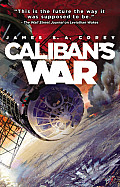
| Series: | The Expanse #2 |
| Publisher: | Orbit |
| Copyright: | June 2012 |
| ISBN: | 0-316-20227-4 |
| Format: | Kindle |
| Pages: | 594 |
This is an ebook, so metadata may be inaccurate or missing. See notes on ebooks for more information.
Caliban's War is the sequel to Leviathan Wakes and the second book in the Expanse series. This is the sort of series that has an over-arching, long-term plot line with major developments in each book, so it's unfortunately easy to be spoiled by reading anything about later volumes of the series. (I'm usually reasonably good at avoiding spoilers, but still know a bit more than I want about subsequent developments.) I'm going to try to keep this review relatively free of spoilers, but even discussion of characters gives a few things away. If you want to stay entirely unspoiled, you may not want to read this.
Also, as that probably makes obvious, there's little point in reading this series out of order, although the authors do a reasonably good job filling in the events of the previous book. (James S.A. Corey is a pseudonym for the writing team of Daniel Abraham and Ty Franck.) I still resorted to reading the Wikipedia plot summary, though, since it had been years since I read the first book.
Caliban's War opens on Ganymede, a year and a half after the events of Leviathan Wakes. Thanks to its magnetosphere, Ganymede enjoys rare protection from Jupiter's radiation field. Thanks to meticulously-engineered solar arrays, it is the bread basket of the outer solar system. That's before an inhuman creature attacks a unit of Earth and then Martian soldiers, killing all but one of them and sparking an orbital battle between Mars and Earth that destroys much of Ganymede's fragile human ecosystem. Ganymede's collapse is the first problem: a humanitarian catastrophe. The second problem is the attacking creature, which may be a new destabilizing weapon and may be some new twist on the threat of Leviathan Wakes. And the third problem is Venus, where incomprehensible things are happening that casually violate the known laws of physics.
James Holden returns to play a similar role as he did in Leviathan Wakes: the excessively idealistic pain in the ass who tends to blow open everyone's carefully-managed political machinations. Unfortunately, I think this worked much less well in this book. Holden has a crisis of conscience and spends rather a lot of the book being whiny and angstful, which I found more irritating than entertaining. I think it was an attempt at showing some deeper nuance in his relationships with his crew, but it didn't work for me.
The new character around whom the plot revolves is Prax, a botanist whose daughter is mysteriously kidnapped in the prelude of the book. (Apparently it can't be an Expanse novel without a kidnapped girl or woman.) He's unfortunately more of a plot device than a person for most of the story. One complaint I have about this about this book is that the opening chapters on Ganymede drag on for much longer than I'd prefer, while running Prax through the wringer and not revealing much about the plot. This is another nearly 600 page book; I think it would have been a tighter, sharper book if it were shorter.
That said, the other two new viewpoint characters, Bobbie and Avasarala, make up for a lot.
Avasarala is an apparently undistinguished member of the UN Earth government who has rather more power than her position indicates because she's extremely good at political maneuvering. I loved her within twenty pages of when she was introduced, and kept being delighted by her for the whole book. One of my favorite tropes in fiction is watching highly competent people be highly competent, and it's even better when they have engagingly blunt personalities. Avasarala is by turns grandmotherly and ruthless, polite and foul-mouthed, and grumpy and kind. Even on her own, she's great; when she crosses paths with Bobbie, the one surviving Martian marine from the initial attack who gets tangled in the resulting politics, something wonderful happens. Bobbie's principled and straightforward honesty is the perfect foil for Avasarala's strategic politics. Those sections are by far the best part of this book.
I think this is a somewhat weaker book than Leviathan Wakes. It starts slow and bogs down a bit in the middle with Holden's angst and relationship problems. But Avasarala is wonderful and makes everything better and gets plenty of viewpoint chapters, as does Bobbie who becomes both a lens through which to see more of Avasarala and a believable and sympathetic character in her own right. The main plot of the series does move forward somewhat, but this feels like mostly side story and stage setting. If you enjoyed Leviathan Wakes, though, I think you'll enjoy this, for Avasarala and Bobbie if nothing else.
Caliban's War satisfactorily closes out its own plot arc, but it introduces a substantial cliff-hanger in the last pages as setup for the next book in the series.
Followed by Abaddon's Gate in the novel sense. There is a novella, Gods of Risk, set between this book and Abaddon's Gate, but it's optional reading.
Reviewed: 2019-03-27